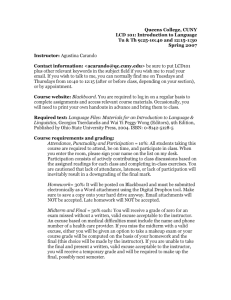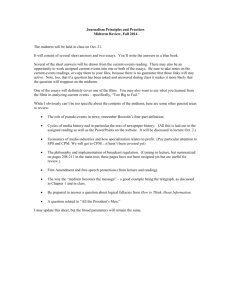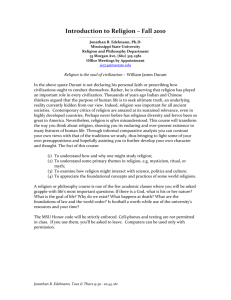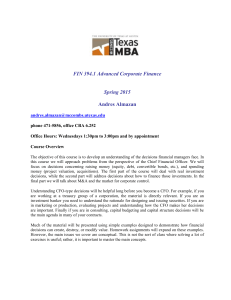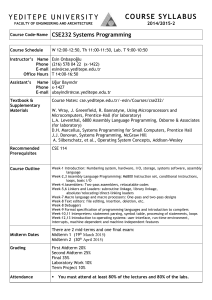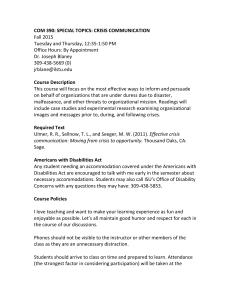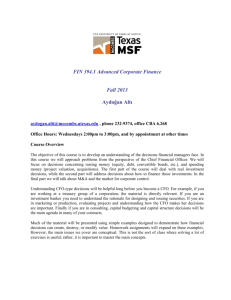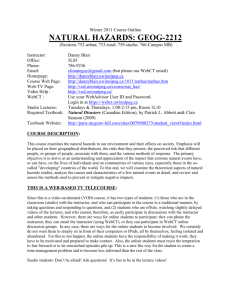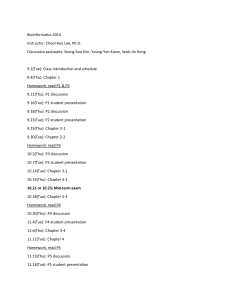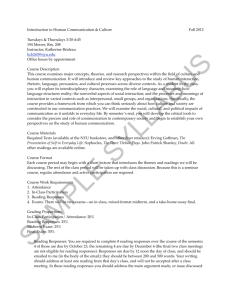es 102 * fundamentals of engineering analysis and scientific
advertisement
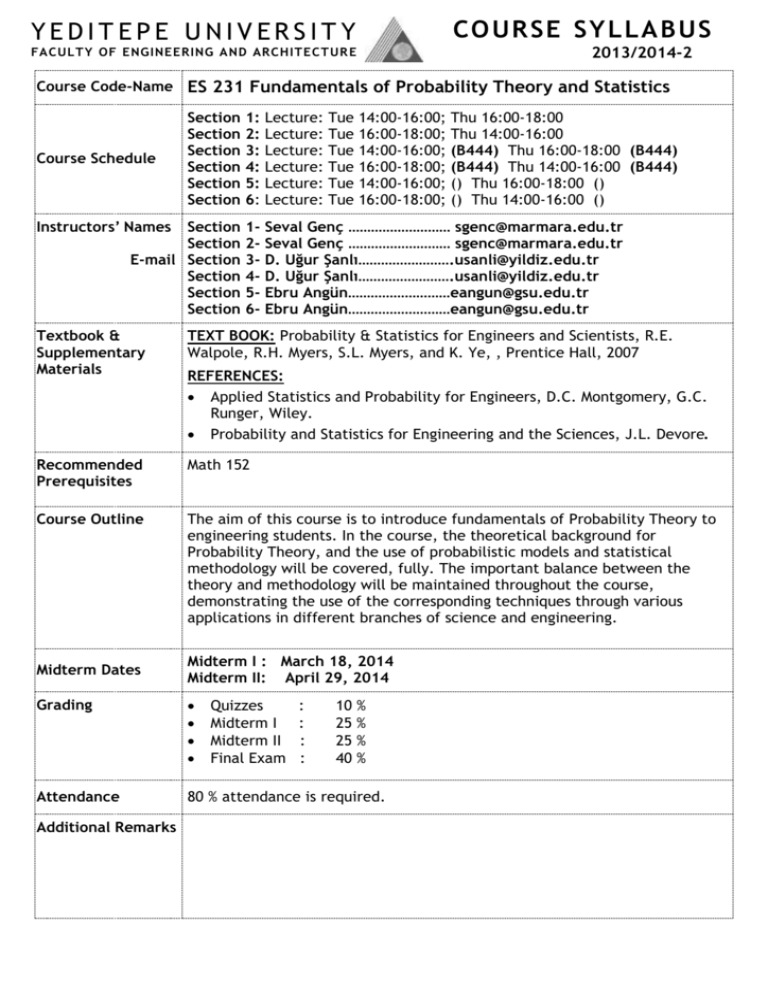
C OUR SE SYLLA BUS YEDITEPE UNIVERSITY 2013/2014-2 FACULTY OF ENGINEERING A ND ARCHITECTUR E Course Code-Name ES 231 Fundamentals of Probability Theory and Statistics Section Section Section Section Section Section 1: 2: 3: 4: 5: 6: Lecture: Lecture: Lecture: Lecture: Lecture: Lecture: Section Section E-mail Section Section Section Section 123456- Seval Genç ……………………… sgenc@marmara.edu.tr Seval Genç ……………………… sgenc@marmara.edu.tr D. Uğur Şanlı…………………….usanli@yildiz.edu.tr D. Uğur Şanlı…………………….usanli@yildiz.edu.tr Ebru Angün………………………eangun@gsu.edu.tr Ebru Angün………………………eangun@gsu.edu.tr Course Schedule Instructors’ Names Tue Tue Tue Tue Tue Tue 14:00-16:00; Thu 16:00-18:00 16:00-18:00; Thu 14:00-16:00 14:00-16:00; (B444) Thu 16:00-18:00 (B444) 16:00-18:00; (B444) Thu 14:00-16:00 (B444) 14:00-16:00; () Thu 16:00-18:00 () 16:00-18:00; () Thu 14:00-16:00 () Textbook & Supplementary Materials TEXT BOOK: Probability & Statistics for Engineers and Scientists, R.E. Walpole, R.H. Myers, S.L. Myers, and K. Ye, , Prentice Hall, 2007 Recommended Prerequisites Math 152 Course Outline The aim of this course is to introduce fundamentals of Probability Theory to engineering students. In the course, the theoretical background for Probability Theory, and the use of probabilistic models and statistical methodology will be covered, fully. The important balance between the theory and methodology will be maintained throughout the course, demonstrating the use of the corresponding techniques through various applications in different branches of science and engineering. Midterm Dates REFERENCES: Applied Statistics and Probability for Engineers, D.C. Montgomery, G.C. Runger, Wiley. Probability and Statistics for Engineering and the Sciences, J.L. Devore. Midterm I : March 18, 2014 Midterm II: April 29, 2014 Grading Attendance 80 % attendance is required. Additional Remarks Quizzes Midterm I Midterm II Final Exam : : : : 10 % 25 % 25 % 40 % YEDITEPE UNIVERSITY C OUR SE SYLLA BUS FACULTY OF ENGINEERING A ND ARCHITECTUR E 2013/2014-2 Course CodeES 231 Fundamentals of Probability Theory and Statistics Name Course Objectives Course Outcomes To understand the fundamentals of probability theory and to be able to apply them. To understand the fundamentals of descriptive statistics and to be able to use them. an ability to apply knowledge of mathematics, science and engineering an ability to design and conduct experiments, as well as to analyze and interpret data Indicates the level of satisfaction of an ability to design a system, component or process to meet desired needs the course for the outcomes an ability to function on multi-disciplinary teams listed. : Not an ability to identify, formulate, and solve engineering problems : Low Level an understanding of professional and ethical responsibility an ability to communicate effectively the broad education is necessary to understand the impact of engineering solutions in a global and societal context a recognition of the need for, and an ability to engage in life-long learning a knowledge of contemporary issues an ability to use the techniques, skills, and modern engineering tools necessary for engineering practice Applicable of Satisfaction : High Level of Satisfaction COURSE PLAN Week Topics 1 3-7/02 Introduction to Probability and Statistics. Statistical Experiments. Outcomes. Events. Sample Space. Set Theory. 2.1, 2.2 2 10-14/2 Interpretations and Axioms of Probability. Basic Theorems of Probability. Finite Sample Spaces. Counting Techniques. Multiplication Rule. Permutations. Combinations. Sampling With and Without Replacement. 2.3, 2.4, 2.5 3 17-21/2 Independence of Events. Conditional Probability. Bayes’ Theorem. 2.6, 2.7, 2.8 4 Discrete Random Variables. Probability Function. Distribution Function. Mean and Variance. 3.1, 3.2, 4.1 (discrete), 4.2 (discrete), 24-28/2 5-6 3-14/3 Special Discrete Distributions (Uniform, Bernoulli, Binomial, Hypergeometric, Geometric, Negative Binomial, Poisson). 5.1, 5.2, 5.3, 5.4, 5.5, 5-6 7 17-21/3 Review Midterm 1 8 24-28/3 Continuous Random Variables. Probability Density Function. 3.3, 4.1 (cont.), 4.2 (cont.) 9 1-4/4 Special Continuous Distributions (Uniform, Normal, Normal Approximation to Binomial, Gamma, Exponential). 6.1, 6.2, 6.3, 6.4, 6.5, 6-6, 6.7 10 7-11/4 Special Continuous Distributions (Uniform, Normal, Normal Approximation to Binomial, Gamma, Exponential). 11-12 14-25/4 Joint, Marginal and Conditional Distributions. Covariance and Correlation. Conditional Mean and Variance. Independence of Random Variables. 3.4, Rest of chapter 4 13 28/4-2/5 Review Midterm 2 14 5-9/5 Introduction to Statistics and Data Analysis 15 12-16/5 Hypothesis Testing and Review Problems
